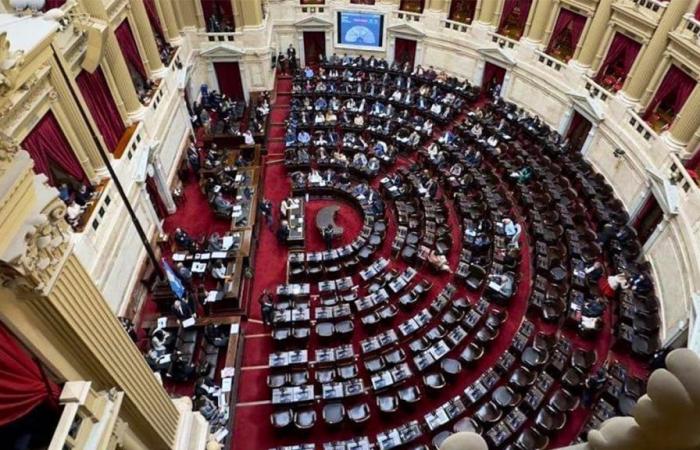Julio Cobos.jpg
The national deputy Julio Cobos (UCR).
“What we approve in Deputies must be prioritized,” insists Pamela Verasay, deputy for Alfredo Cornejo’s kidney, instead. Lisandro Nieri thinks the same; and that is what the ruling party will defend, according to what he told Diario UNO Álvaro Martínez from Mendozaa demarchist ally of La Libertad Avanza.
►YOU MAY BE INTERESTED: The occupancy of this long weekend in Mendoza did not exceed 60% according to CAME
The discussion on the Bases Law has already begun in Deputies
Although the text of the Bases and Fiscal laws has not yet entered the Lower House, on the same Thursday after its approval in the Senate, Francos’ meetings with the heads of dialogue blocs began.
The Executive stated its position: insist on the projects just as they came out of Deputieswith the changes to Income and Personal Property Taxthe privatization of Argentinian airlines and the elimination of retirement mobility inside.
“Since it was approved in the Senate, we began to work to understand in depth the changes with which the law returns,” he told ONE Diary Verasay.
Lisandro Nieri and Pamela Verasay.JPG
Verasay and Nieri, two radicals from Mendoza in the Lower House.
►YOU MAY BE INTERESTED: The Mendoza ruling party calculated that, with the rejection of Ganancias, the province loses more than $75,000 million
“We understand that what we approve in Deputies must be prioritized,” he pointed out from the Cornejismoemphasizing that it must be treated as soon as possible: “We do it from minute one, quickly because the Government cannot continue without its law.”
Alvaro Martinez He also emphasized that the process must be brief in the Deputies – the Government wants the laws by June 27 – and that he will seek to “insist on issues that have been poorly modified or that are essential for the reforms that we need; and also to be consistent with what Deputies ordered which is the chamber of origin”.
In any case, he was open to the possibility that some changes introduced by the senators will be maintained if they are “issues that improve the law and not merely political.”
Álvaro Martínez January 31.jpg
The demarchist deputy Álvaro Martínez.
►YOU MAY BE INTERESTED: The Bases Law and the radical-libertarian Mendoza in the times of Milei
Julio Cobos, meanwhile, told Diario UNO that the radical bloc does not yet have a unified position and that theirs is to vote on the Bases Law as it comes from the Senate but insist on changes in Profits and Personal Assetswhich were approved in the Deputies and were voted negatively in the Upper House.
“There is a legal question that will be under discussion and in which everyone seems to be right, according to the interpretation of the Constitution,” says Cobos. What he is referring to is the possibility or not that deputies have to insist on the original version if the Senate did not even put some articles to a vote. On the other hand, Cobos analyzes that if these variants were arrived at through political agreements in the Senate for the law to be approved in general, they would have to be respected. Hence his position of leave the Bases Law as it comes from senators.
Regarding this legal issue, Martínez assures that “we can insist on the texts of Deputies because they are not new topics, topics raised from scratch.” And he explains: “If it had been rejected in general (in the Senate), it cannot be insisted upon. As it was approved in general, the half sanction of Deputies can be ratified and rejected topics can be reinstated.
The radical deputy for Córdoba Soledad Carrizo, a lawyer, is one of those who takes the lead on this issue within the radical bloc. In a thread on the social network X, she explains that there are three alternatives:
- Approve everything as it has been resolved in the Senate.
- Approve only some of your changes and reject others.
- Insist on the medium sanction as approved in the session of April 29.
But what does the majorities with which they were approved in senators play for this: “If the changes in the Senate were approved with an absolute majority (more than half), we need that same majority to insist on our original project and reject those changes.
“If they were approved with two-thirds in the Senate, we need to reach that same majority. It depends on the articles and chapters, in some cases they were approved with an absolute majority, in others with a special majority.” “If they were approved with two-thirds in the Senate, we need to reach that same majority. It depends on the articles and chapters, in some cases they were approved with an absolute majority, in others with a special majority.”
And can we insist on rejected or discarded articles or chapters? She says yes. “The impediment established by the Constitution to re-treat only refers to ‘completely discarded projects.’ If the Magna Carta does not indicate ‘discarded articles, chapters or titles’, ‘partially discarded projects’, we cannot invent that distinction“he emphasizes.






